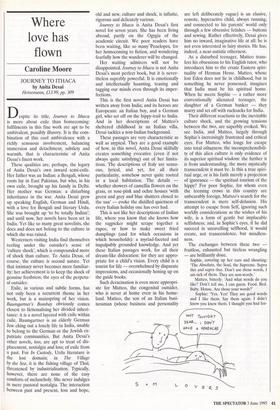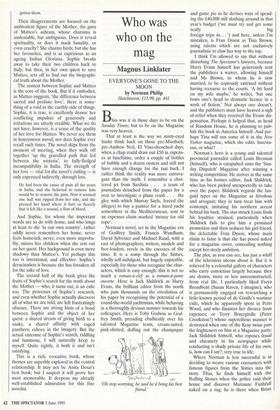Where love has flown
Caroline Moore JOURNEY TO ITHACA by Anita Desai Heinemann, £13.99, pp. 309 Despite its title, Journey to Ithaca is more about exile than homecoming: fulfilments in this fine work are apt to be ambivalent, possibly illusory. It is the com- bination of this cool ambivalence with a richly sensuous involvement, balancing immersion and detachment, subtlety and warmth, that is characteristic of Anita Desai's finest work.
These qualities are, perhaps, the legacy of Anita Desai's own inward semi-exile. Her father was an Indian: a Bengali, whose roots lay in East Pakistan, but who, in his own exile, brought up his family in Delhi. Her mother was German: a disturbing inheritance in the war. Anita Desai grew up speaking English, German and Hindi, with a love for Bengali and literary Urdu. She was brought up 'to be totally Indian'; and until now, her novels have been set in India. Yet like so many great novelists, she does and does not belong to the culture in which she was raised.
Westerners visiting India find themselves reeling under the outsider's sense of `culture shock', which is compounded more of shock than culture. To Anita Desai, of course, the culture is second nature. Yet that intimacy never becomes mere familiar- ity: her achievement is to keep the shock of genuine freshness, the eyes of the perpetu-* al outsider.
Exile, in various and subtle forms, has not only been a recurrent theme in her work, but is a mainspring of her vision. Baumgartner's Bombay obviously comes closest to fictionalising her divided inheri- tance: it is a novel layered with exile within exile. Baumgartner is an elderly German Jew eking out a lonely life in India, unable to belong to the German or the Jewish ex- patriate communities. But Anita Desai's other novels, too, are apt to treat of dis- placement, nostalgia and loss; of exile from a past. For In Custody, Urdu literature is the lost domain; in The Village by the Sea, it is the fishing village of Thul, threatened by industrialisation. Typically, however, there are none of the easy comforts of melancholy. She never indulges in mere pastoral nostalgia. The interaction between past and present, loss and hope, old and new, culture and shock, is infinite, rigorous and delicately various.
Journey to Ithaca is Anita Desai's first novel for seven years. She has been living abroad, partly on the Ogygia of the academic circuit. We poor readers have been waiting, like so many'renelopes, for her homecoming to fiction, and wondering fearfully how the wanderer will be changed.
Her waiting admirers will not be disappointed. Journey to Ithaca is not Anita Desai's most perfect book, but it is never- theless superbly powerful. It is emotionally and intellectually haunting, teasing and tugging our minds even through its imper- fections.
This is the first novel Anita Desai has written away from India; and its heroes are Europeans: an Italian boy, and a German girl, who set off on the hippy-trail to India. And in her descriptions of Matteo's sheltered childhood in an Italian villa, Desai tackles a non-Indian background.
These passages are very characteristic as well as atypical. They are a good example of how, in this novel, Anita Desai skilfully creates something evocative (even if not always quite satisfying) out of her limita- tions. The descriptions of Italy are sensu- ous, lyrical, and yet, for all their particularity, somehow never quite rooted in a local habitation. The details whether showers of camellia flowers on the grass, or rose-pink and ochre houses 'with green and grey and blue shutters closed to the sun' — evoke the distilled quietness of every Italian holiday one has ever had.
This is not like her descriptions of Indian life, where you know that she knows how the ragpicker might scrape together a rupee, or how to make sweet fried dumplings (and for which occasions in which households): a myriad-faceted and impalpably grounded knowledge. And yet these Italian passages work, for all their dream-like dislocation: for they are appro- priate for a child's vision. Every child is a tourist for life — overwhelmed by disparate impressions, and occasionally honing up on the guide books.
Such deracination is even more appropri- ate for Matteo, the congenital outsider, who is never at home even in his home- land. Matteo, the son of an Italian busi- nessman (whose business and personality are left deliberately vague) is an elusive, remote, hyperactive child, always running, and connected to his parents' world only through a few obsessive fetishes — buttons and sewing. Rather effectively, Desai gives him no inward, imaginative life at all: he is not even interested in fairy stories. He has, indeed, a near-autistic otherness.
As a disturbed teenager, Matteo trans- fers his obsessions to his English tutor, who introduces him to the ersatz Eastern spiri- tuality of Herman Hesse. Matteo, whose lost Eden does not lie in childhood, but in something he never possessed, imagines that India must be his spiritual home. When he meets Sophie — a rather more conventionally alienated teenager, the daughter of a German banker — they marry and set off with rucksacks for India. Their different reactions to the inevitable culture shock, and the growing tensions between the two, are superbly evoked. We see India, and Matteo, largely through Sophie's increasingly frustrated and critical eyes. For Matteo, who longs for escape into total otherness; the incomprehensibili- ty of this alien culture is only evidence of its superior spiritual wisdom: the further it is from understanding, the more mystically transcendent it must be. Is this a true spiri- tual urge, or is his faith merely a projection of ignorance — the spiritual tourism of the hippy? For poor Sophie, for whom even the teeming crows in this country are unbearably foreign, Matteo's search for the transcendent is mere self-delusion. His attempt to escape from Self, ignoring such worldly considerations as the wishes of his wife, is a form of gentle but implacable selfishness; and, in Sophie's eyes, if he did succeed in unravelling selfhood, it would create, not transcendence, but mindless- ness.
The exchanges between these two fruitless, exhausted but tireless wrangling — are brilliantly done.
Sophie, covering up her ears and shouting: `The Absolute, the Soul, the Supreme. Supra this and supra that. Don't use those words, I am sick of them. They are non-words.'
Matteo, bitterly: 'And what words do you like? Don't tell me, I can guess. Food. Bed. Baby. House. Are those your words?'
Sophie: 'Yes. Yes! They are good words and I like them. Say them again. I didn't know you knew them. I thought you had for- gotten them.
Their disagreements are focused on the ambivalent figure of the Mother, the guru of Matteo's ashram, whose charisma is undeniable, but ambiguous. Does it reveal spirituality, or does it mask banality, or even cruelty? She charms birds; but she has her favourites, and is as capricious as an ageing Indian Gloriana. Sophie breaks away to take their two children back to Italy; but then, in her own quest to save Matteo, sets off to find out the biographi- cal truth about the Mother.
The contest between Sophie and Matteo is the core of the book. But if it embodies, as Matteo suggests, 'the difference between sacred and profane love', there is some- thing of a void in the earthly side of things. Sophie, it is true, is excellently drawn: her conflicting impulses of generosity and irritations are utterly credible. What we do not have, however, is a sense of the quality of her love for Matteo. We never see them in honeymoon mood; nor does Sophie ever recall such times. The novel skips from the moment of meeting, when they walk off together 'up the gravelled path that led between the wisteria', to fully-fledged incompatibility in India. The strength of her love — vital for the novel's ending — is only expressed indirectly, through loss.
He had been the cause of pain all the years in India, and she believed to remove him would be to remove the pain. Now it seemed one half was ripped from her side, and she pressed her hand where it hurt so fiercely that it felt like a wound, a flow of blood.
And Sophie, for whom the important words are to do with home, and who longs at least to die 'in our own country', rather oddly never remembers her home, never feels homesick; never, even more improba- bly, misses her children when she sets out on her quest. Her background is even more shadowy than Matteo's. Yet perhaps this too is intentional, and effective: Sophie's deracination is because she has forsaken all for the sake of love.
The second half of the book gives the fruits of Sophie's search for the truth about the Mother — who, it turns out, is an exile too. The processes of Sophie's research, and even whether Sophie actually discovers all of what we are told, are left frustratingly obscure. There are strong hints of a bond between Sophie and the object of her quest: a shared dream of giving birth to a snake, a shared affinity with caged panthers; echoes in the imagery. But the actual outcome of Sophie's search, riddling and luminous, I will naturally keep to myself. Quite rightly, it both is and isn't satisfying.
This is a rich, evocative book, whose themes are superbly explored in the central relationship. It may not be Anita Desai's best book; but I suspect it will prove her most memorable. It deepens my already well-established admiration for this fine novelist.



































































 Previous page
Previous page